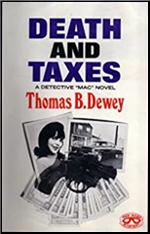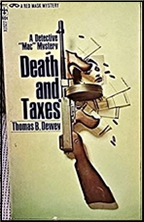Fri 13 Jan 2023

THOMAS B. DEWEY – Death and Taxes. Mac #14. G. P. Putnam’s Sons, hardcover, 1967. Berkley, paperback, May 1968.
This one starts out the way a good old-fashioned PI story should – no, I’ll take that back. Any good PI story should start with a good-looking blonde entering the PI’s office as a would-be client. But consider this as the next best thing:
Given that Marco Paul having been an old-fashioned Chicago gangster for most of his life, and this is an old-fashioned hit straight out of Black Mask Magazine, you might even decide that this is a better first sentence than the worn-out Gorgeous Blonde Client Gambit.

And as it turns out, Marco Paul is/was on the verge of becoming Mac’s client. What Paul wanted Mac to do is make sure that his daughter gets the million dollars in cash he has stashed away for her, tax-free.
So far, Mac has said he’d think about it. Does he know where the million dollars is? No. They hadn’t gotten around to that. Do other parties (both friends — some closer than others — and family) think he knows where the million dollars is? Yes, and they become actively involved in finding out where it is.
At one point along the way Mac is severely tortured and beaten. Does he recover in the very next scene and carry on as usual, as a certain detective named Joe Mannix always did after being conked on the head? No. Definitely not. This is real life that Mac is living through, and real life often hurts.
I mentioned Black Mask a short distance upstairs. This reads – or at least the first half does – like a finely tuned Black Mask story, a little more literate and a little more polished, perhaps, and it is a lot of fun to read. Unfortunately when it comes time to pull all of the plot threads together, Death and Taxes becomes a lot more standard type of PI tale, with lots of guns blazing away and a lengthy explanation of who did what to whom and when.
I going to call it a mixed bag, then, and let you decide, once you take me up on this proposition, to read this for yourself and tell me which half you preferred.
January 13th, 2023 at 6:52 am
“The good-looking blonde entered my small one-man P.I. office, drew a gun and went to the window, where she shot Marco Paul on June 18 at 2:15 in the morning in an allley next to my office, which was located behind a place called Ezra’s on the Northeast Side.”
Happy, now?
January 13th, 2023 at 2:39 pm
Not bad for a start, Jerry. Not bad at all.
January 13th, 2023 at 12:03 pm
I can tell you I bought that Berkley edition off the paperback spinner rack in Stephenville, Texas, in June 1968, on the way to my aunt’s house in Blanket, Texas. Unfortunately, I don’t recall a thing about the book itself other than that I liked it. But I’ve liked every one of Dewey’s Mac novels that I’ve read. I’m a little less fond of his Pete Schofield novels and his Singer Batts novels, although they’re still okay.
January 13th, 2023 at 2:50 pm
I’m rather sure the paperback I just read was one I bought new myself. When I started in on it on Wednesday, it didn’t look as though it had ever bee opened. I’m glad I finally did.
.
As for Dewey’s Pete Schofield books, I’m with you. Lightweight and not nearly as interesting.
January 14th, 2023 at 12:32 am
I consider the Mac books as only a step below Ross Macdonald, and well up there in the ranks of the best P.I. tales of the era (Evans Paul Pine and Spicer’s Carny Wilde are up there as well).
I like Dewey’s other books and characters, but for my money he surpassed himself with the Mac series.
Mac eventually got a last name (Robinson) and one book was adapted on television with Hugh O’Brian as Mac.
January 14th, 2023 at 12:52 pm
I’ve only read a couple—one was ‘Sad Song Singing’ which Pronzini said was on his personal top 10 list of best pi novels of all time. I would tend to agree.
January 14th, 2023 at 5:13 pm
In the article there is a reference to “Black Magazine” that I think is supposed to be Black Mask.
January 14th, 2023 at 5:46 pm
Indeed it was. Thanks, Brian!